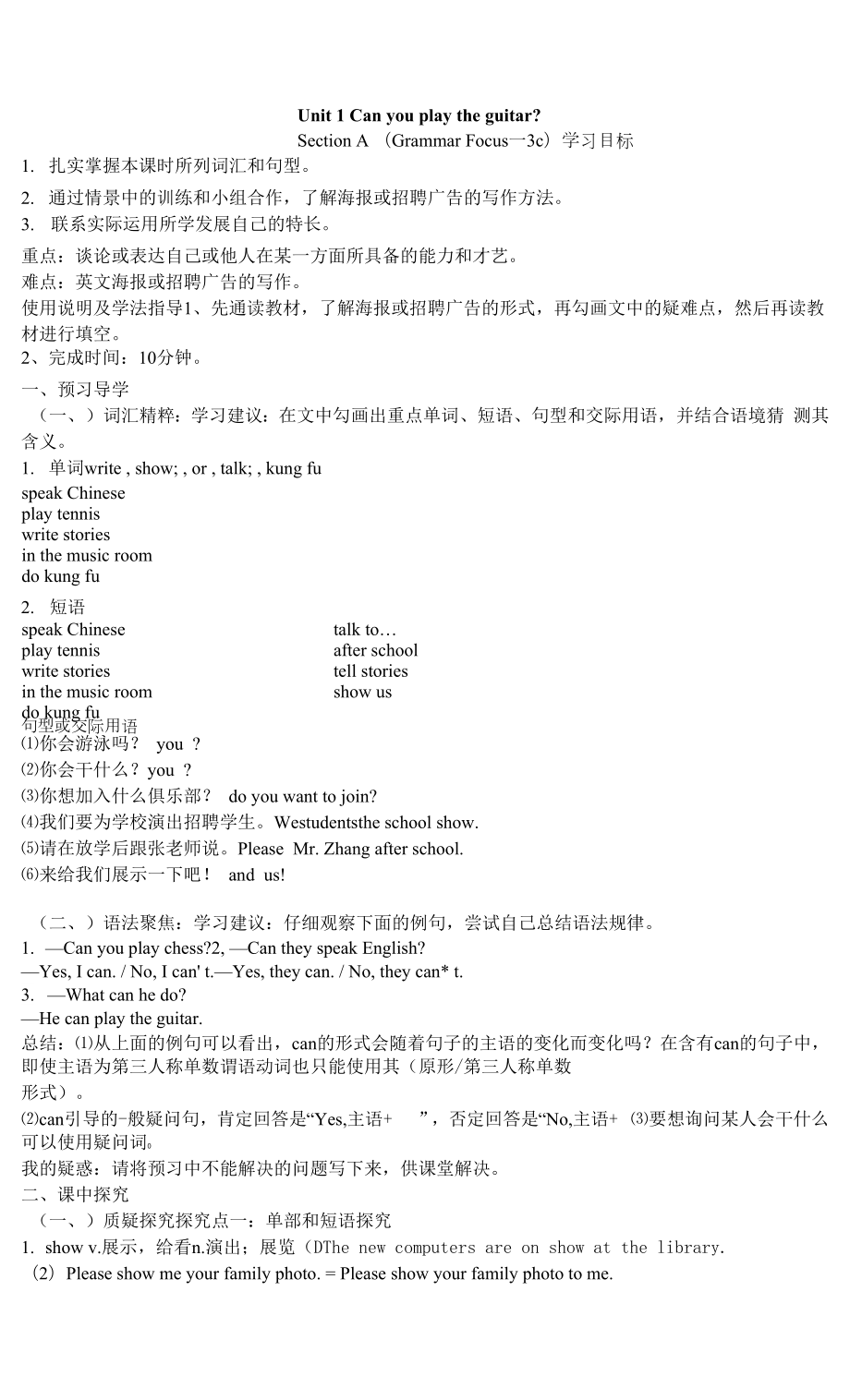《Unit-1SectionA(GrammarFocus—3c)學(xué)案- 人教新目標(biāo)七年級英語下冊.docx》由會員分享,可在線閱讀�,更多相關(guān)《Unit-1SectionA(GrammarFocus—3c)學(xué)案- 人教新目標(biāo)七年級英語下冊.docx(3頁珍藏版)》請在裝配圖網(wǎng)上搜索。
1、Unit 1 Can you play the guitar?
Section A (Grammar Focus一3c)學(xué)習(xí)目標(biāo)
1. 扎實掌握本課時所列詞匯和句型�。
2. 通過情景中的訓(xùn)練和小組合作,了解海報或招聘廣告的寫作方法�。
3. 聯(lián)系實際運(yùn)用所學(xué)發(fā)展自己的特長。
重點(diǎn):談?wù)摶虮磉_(dá)自己或他人在某一方面所具備的能力和才藝�。
難點(diǎn):英文海報或招聘廣告的寫作。
使用說明及學(xué)法指導(dǎo)1�、先通讀教材,了解海報或招聘廣告的形式�,再勾畫文中的疑難點(diǎn),然后再讀教材進(jìn)行填空�。
2、完成時間:10分鐘�。
一、預(yù)習(xí)導(dǎo)學(xué)
(一�、)詞匯精粹:學(xué)習(xí)建議:在文中勾畫出重點(diǎn)單詞、短語�、句型和交際用語
2、�,并結(jié)合語境猜 測其含義。
1. 單詞write , show; , or , talk; , kung fu
2. 短語speak Chinese
play tennis
write stories
in the music room
do kung fu
speak Chinese
play tennis
write stories
in the music room
do kung fu
talk to…
after school
tell stories
show us
句型或交際用語
⑴你會游泳嗎�? you ?
⑵你會干什么?you ?
3�、
⑶你想加入什么俱樂部? do you want to join?
⑷我們要為學(xué)校演出招聘學(xué)生�。Westudentsthe school show.
⑸請在放學(xué)后跟張老師說�。Please Mr. Zhang after school.
⑹來給我們展示一下吧�! and us!
(二、)語法聚焦:學(xué)習(xí)建議:仔細(xì)觀察下面的例句�,嘗試自己總結(jié)語法規(guī)律。
1. —Can you play chess?2, —Can they speak English?
—Yes, I can. / No, I can' t.—Yes, they can. / No, they can* t.
3.
4�、—What can he do?
—He can play the guitar.
總結(jié):⑴從上面的例句可以看出,can的形式會隨著句子的主語的變化而變化嗎�?在含有can的句子中,即使主語為第三人稱單數(shù)謂語動詞也只能使用其(原形/第三人稱單數(shù)
形式)�。
⑵can引導(dǎo)的-般疑問句,肯定回答是“Yes,主語+ ”�,否定回答是“No,主語+ ⑶要想詢問某人會干什么可以使用疑問詞0
我的疑惑:請將預(yù)習(xí)中不能解決的問題寫下來,供課堂解決�。
二、課中探究
(一�、)質(zhì)疑探究探究點(diǎn)一:單部和短語探究
1. show v.展示,給看n.演出�;展覽(DThe new computers are
5、on show at the library.
(2)Please show me your family photo. = Please show your family photo to me.
思考:1)例句⑴中show的詞性是�,例句⑵中show的詞性是。
2)根據(jù)例句⑵可以看出�,要表示“給某人看某物”可以使用兩種形式�,即:show sb. sth =tell v.講述;吩咐�;命令
(DCan you tell stories?(2)Tell him to go to school on Monday.
思考:1)例句⑴中tell的意思是" ”�。2)tell sb. to do
6�、 sth.表示"talk to 和說
You can talk to your parents.
思考:talk〔o,表示"
探究點(diǎn)二:重難點(diǎn)句子探究
Can you dance or sing?
Can he play tennis or soccer?
Can they speak English or Chinese? 思考:⑴以上是由or構(gòu)成的
I want to talk to your teacher.
Is she Lily or Lucy?
Is this pen yours or his?
Are the socks yellow or blue?
疑問
7、句�,它是指提問者提供兩種或兩種以上的情況,讓對方從中作出選擇的句子�。
⑵請根據(jù)例句歸納一下這種句式的結(jié)構(gòu)。
一般疑問句+ +并列的另一個選項�,or表示“或者,還是”�。
⑶這種句子在回答時和一般疑問句不同,不能使用和,而是直接用陳述句或簡略形式�。
探究三:重點(diǎn)語法探究Amy can play the guitar.
(1) Bill can5 t play chess.
⑶—Can you speak Chinese? —Yes, I can. / No. I can' t.
思考:本單元的主要語法項目是情態(tài)動詞can的用法。can沒有人稱和數(shù)的變化�,其后要使用動 詞原形。它所在的
8�、句子三種常見句型是:
1) “主語+can+動詞原形+其他是 o“主語+can' t+動詞原形+其他是 o
2) “Can+主語+動詞原形+其他?”是 ,其肯定回答是“Yes,主語+can.”�;否定回答是 “No,主語+can' t."。
總結(jié):(學(xué)習(xí)建議:回顧本節(jié)課的內(nèi)容�,從課文理解和長難句分析方面進(jìn)行二次領(lǐng)會和記憶。) 達(dá)標(biāo)檢測:
l.Do you want to go to a (演出)�?
2.1 want to (跟說)Mr. Zhang.
3. Mr. Zhang is (在音樂室里).
4. He can (講故事).
5. Can you (打網(wǎng)球)
LI can swim.(改為否定句)1 swim.
2. He can play the guitar.(改為一般疑問句) Play the guitar?
3. Jane can do Chinese kung fu.(對畫線部分提 問) can
Jane ?
4. Amy wants to join the art club.(對畫線部分提問) does Amy want to join?
5. speak, she, can, English (連詞成句)
 Unit-1SectionA(GrammarFocus—3c)學(xué)案- 人教新目標(biāo)七年級英語下冊.docx
Unit-1SectionA(GrammarFocus—3c)學(xué)案- 人教新目標(biāo)七年級英語下冊.docx

